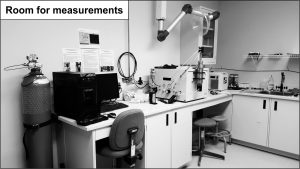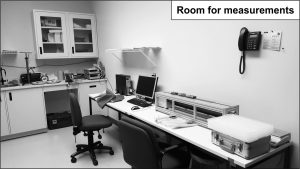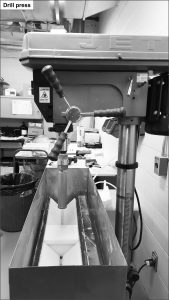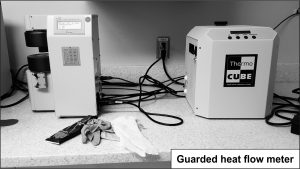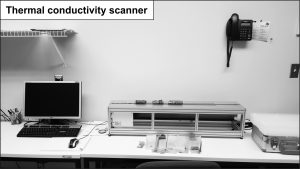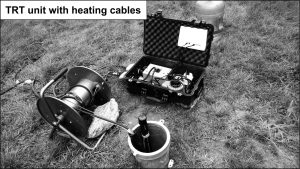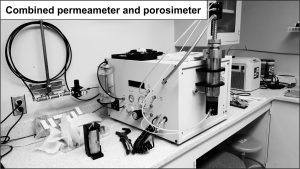The objective of the research carried out at the LOG is to improve the understanding of underground heat transfer and flow phenomenon, reducing technological risks related geothermal energy production. The laboratory comprises an infrared scanner, a guarded heat flow meter, a combined automated permeameter and porosimeter, and specialized cutting devices. This equipment is complementary to the CT scanner of the INRS allowing to combine infrared and X-ray scanning techniques, a world premiere for a geothermal laboratory. Researchers characterize the thermal and hydraulic properties of rock samples to model the impact of subsurface heterogeneity on the performance of geothermal systems of all kinds.
-> Lab Sheet (PDF)
The Geothermal Open Laboratory:
a free space
to measure thermal and hydraulic properties
of geological materials
-> Article
-> Presentation
1. PREPARATION OF SAMPLES
A room is used to prepare rock samples into core plugs for analysis, with this available equipment:
Drill press
MDP-405 de CoreTest
The drill press is used to cut rock samples in cores of 1.0, 1.5 and 2.0 ” diameter and up to 4.5″ in length
Dual Trim Saw with End Face Grinder
DTS-430 de CoreTest
The double cut saw is used to prepare 1.5, 2 and 3.5 ” thick plugs with parallel ends. A grinder is also part of the system to smooth the ends of the samples.
2. MEASUREMENTS
A second room stores the measuring instruments available to the scientific community to characterize thermal and hydraulic properties of rock samples:
Guarded heat flow meter
FOX50 de TA Instruments
The heat flow meter is used to measure the thermal conductivity of core plugs in steady-state under different temperatures. Volumetric heat capacity can also be evaluated during the transient period before thermal equilibrium is reached within the sample.
– Thermal conductivity: 0,1 W/m·K – 10,0 W/m·K
– Sample: core plug up to 2,5″ diameter et 1″ thickness
– Temperature range: -10 to 190 °C
Thermal conductivity scanner
TCScan from Lippmann Geophysikalische Messgeräte
This infrared scanner measures the thermal conductivity and thermal diffusivity using infrared optical scanning. Local measurements, made without contact and along scan axes, allow to evaluate the distribution of thermal properties and to quantify the heterogeneity.
– Thermal conductivity: 0,2 – 25,0 W/m·K
– Thermal diffusivity: 0,6 – 3,0 10-6 m2/s
– Sample: flat surface with a minimum diameter of 1,5″
Needle probe
KD2 Pro de Decagon (aiguille RK-1)
The needle probe is a device used to measure the thermal conductivity and thermal diffusivity of rock samples or unconsolidated sediments. A hole needs to be drilled first in the solid samples in order to insert the needle.
– Thermal conductivity: 0,1 – 6,0 W/m·K
TRT unit with heating cables
Made jointly by INRS and École de technologie supérieure (ÉTS)
The apparatus is used to conduct thermal response tests using a heating cable installed in boreholes to evaluate a thermal conductivity profile of the subsurface.
Combined permeameter and porosimeter
AP-608 de CoreTest
The permeameter/porosimeter allow to evaluate the permeability and porosity of rock samples in drill cores under specific hydrostatic and stress conditions such as those encountered in underground reservoirs. The device uses helium to calculate these parameters.
– Confining pressure: 500 – 10 000 psi
– Porosity: 0,1 – 40 %
– Permeability: 0,001 mD – 10 000 mD
– Samples: core plug of 1 ou 1,5″ diameter and 1 à 4″ thickness
Portable permeameter
PPP-250 de Core Laboratories
The portable permeameter provides an accurate method for determining gas permeability in the field and in the laboratory. Measurements can be made on outcrops or drill cores. The pressure decrease of the air injected into the rock is measured as a function of time to calculate the permeability according to the transient methods.
